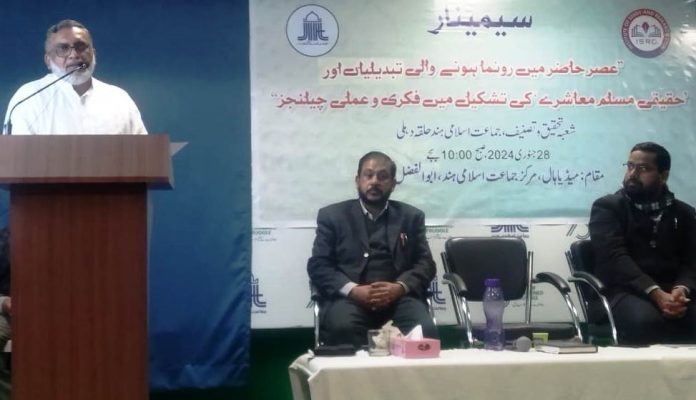New Delhi, Feb. 6: At a recent seminar, Jamaat-e-Islami Hind (JIH) Vice President Malik Motasim Khan emphasized the urgent need to counter the growing influence of Western thoughts and ideologies while simultaneously fostering intellectual maturity within the Muslim community.
Titled “Practical and Ideological Challenges in Forming a True Islamic Society in the Contemporary Changing World,” the seminar was jointly organized by JIH Delhi and Institute of Studies and Research Delhi (ISRD), at JIH Media Hall.
Chairing the seminar, Malik Motasim Khan warned of the pervasive influence of Western ideas, even within homes and families, and called for a concerted effort to counter these challenges. He emphasized the importance of promoting Islamic thought to safeguard the community from harmful influences and preserve its values and structures. He said, “Nurturing and promoting moral values in schools and colleges is the most important responsibility of the youth, and institutions should also make arrangements to promote these values.”
During the seminar, four articles were presented exploring diverse issues faced by the Muslim community.
JIH National Secretary Shaista Rafat addressed the topic, “Conditions and Ideological and Practical Trends of Young Women and Women Associated with Home and Employment,” exploring the experiences and perspectives of young women across various spheres of life.
In his paper, “Means for the Intellectual and Practical Advancement of Children: Challenges and Opportunities”, JIH Delhi Secretary (Research) Mohammad Asif Iqbal analyzed obstacles hindering children’s progress and proposed a course of action based on available resources.
In his article, “Intellectual, Scientific, and Practical State of Youth and Action Plan,” Tayyab Ahmed Baig, Editor Kanti Weekly addressed the intellectual decline and educational challenges faced by youth. He advocated for the Quran and Sunnah as a source of guidance for overcoming their practical challenges.
In his paper, “Current Economic System and Consequences of Muslims’ Disconnection with the Islamic Economic System” Muhammad Sikandar examined the economic realities confronting the Muslim community within the larger national context. He examined the economic realities facing the Muslim community in the country.
Various speakers including Dr. Mujahid Islam, Shazia Bari, Sanobar Jilani, Khaliquz Zaman, Zahid Hussain, Adnan Yosuf, and Omar Yousuf offered their insights on the presented topics. Sajid Umair introduced the seminar and outlined its objectives.
The seminar was attended by a large number of scholars, academicians, and students.




